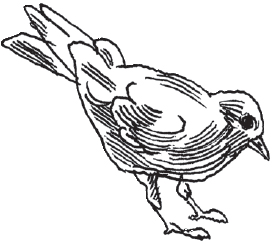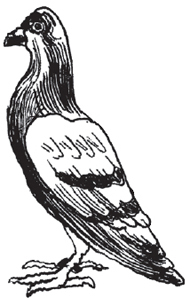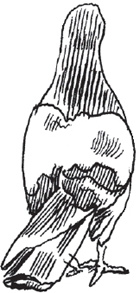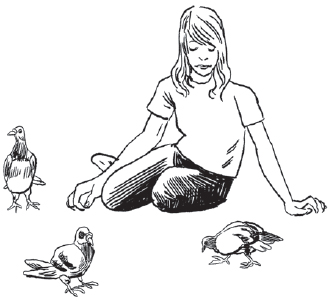Mermaid in Chelsea Creek (15 page)
Read Mermaid in Chelsea Creek Online
Authors: Michelle Tea

“Is it okay,” the pigeon began, “if we talk to you? We don't want to scare you.”
The pigeon's voice was beautiful. It was a soothing sound, melodious. It was a lullaby, a noise made with love to address the beloved, a coo. Sophie wondered if the bird spoke in such a way to everyone,
or if she were special. Then she realized that a
pigeon
was
speaking
to her, and realized she was in fact quite special. Special, not crazy.
“You don't scare me,” Sophie responded. “Are you Livia, Dr. Chen's pigeon?”

The bird ducked its head in a deliberate nod. “Dr. Chen takes care of us. We roost in the home she keeps for us on her roof. But we are all our own birds.” The flock cooed in agreement.
“Sophie,” Livia began. “We know so much about you. We've been waiting for you for so long; generations of pigeons speak of your coming. We can't believe we are so lucky to be here, in Chelsea, at the time of your arrival. We've been keeping your story for you, and the greater story you are to become a part of. We've taken such care to repeat the story carefully, to remember all the details and not confuse them. Your story is so old, none of us can trace its origin, it's just the story we have always been told and have grown to tell our fledglings. Back when there were carrier pigeons, the carrier pigeons told the story of you. Back before we were degraded, when we were called rock doves and lived in barns and trees and were regarded by humans the way other birds are regarded, respected, even then we told your story.”
“But then there was rebellionâ” another bird stepped forwarded, his waddle more pronounced. Sophie could see that one of his pink bird legs ended not in a pronged claw, but in a mottled bundle, a blob. It looked painful to walk upon, and she watched the bird shift its weight, holding the wounded foot gingerly above the ground. “When the wars with the humans began, when they started leaving us poison, poison to eat and poison to land in, just poison everywhere, and that foolish rice they think we'd be dumb enough to eat, and throwing nets over our homes so that we were separated from our babies and our babies would die, and when they nailed jagged things to where we slept so that we had to roam the streets, looking for a safe place to sleep that wasn't netted or poisoned or nailed with jagged thingsâ”
“Arthur,” Livia cooed at the bird, who had gotten quite heated, his feathers trembling.
“All I mean is, throughout all of this, still we kept your story, all of us here.” Arthur's wing swung out from his side and motioned to the shifting crowd behind him. “Many birds refused. They almost had me convinced, too, after my accident.” Arthur shook his melted foot at Sophie. “I was so hurt and in such pain. I thought,
Why should we do anything for people, when they are trying, day and night to kill us?
”
“Arthur,” Livia cooed.
“I know,” he assured her. “Livia brought me to my senses. It's the darkness in the humans that makes them do such things. I tried to explain this to the rebellion, but they didn't want to hear it. They
refused to keep your story, or worse, they tried to scramble it, tell a false story, and fill it with misinformation.”
“Why?' Sophie asked, distraught at the thought of a flock of shit-talking pigeons out to smear her name.
“Because they hate humans,” Arthur explained with a feathery shrug. “And you have been sent here to save them.”
“Save
humans
?” Sophie asked. “Save them from what?”
“From themselves, dear,” Livia spoke. “From the darkness inside them. You have felt it, is that correct? How old are you?”
“Thirteen,” Sophie said. The birds cooed and fluttered.
“Well, thirteen, yes, surely you would have felt some of this, this human darkness? The mermaid, there in the creek. She showed it to you, is that right?” The bird spoke with a politeness that seemed to belong to another era. If she were a woman, Sophie thought, a straw hat would sit on her head, and her hands would wear white gloves. Sophie held on to this idea of Livia as the reminder of what happened in the creek began to curl the edges of her memory. If all the pain the world had ever felt, the pain of the predator and of the victim, if all that madness had been stuffed into a cave to fester and ferment for a hundred thousand yearsâthat was the hole Sophie had been dropped into. The recollection made the hair across her body stand as if surged with electricity, and her bowels churned like she'd eaten something foul.
“Oh,” said Livia, waddling toward the girl. “Oh, now, I didn't mean toâ” Livia lept upon Sophie's shoulder and placed the soft tip of her wing to her clammy forehead. “Salt!” Livia barked, and a handful of
birds took the sky, scattering in different directions. Livia unfolded her wing and fanned Sophie's sweating face.

“I'm sorry,” Sophie murmured. “I don't know why I feel so sick all of a sudden. If I could lie down⦔
A trio of birds swept the dirt with their wings, brushing back rocks and chip bags, plastic soda cups and smashed glass. Sophie laid her head on the soft patch of dirt they'd combed for her. She could feel where her wet hair had crusted to her cheeks, stuck there with mud and creek grime. She placed her hands to her gurgling stomach. “The creek water,” she said to the bird. “I was in the creek⦠or the water got in me, I don't know⦔
“It's not that, lovey,” cooed the bird, pushing cooled air through her feathers and into Sophie's face. Sophie inhaled the smell of the bird. Not the stink of a rat, though Sophie now realized she had never smelled a rat. Livia smelled like hay, Sophie imagined, something woodsy and warm. Like the pavement, yes, but like the pavement on a hot day, baked like clay, a clean-dirty smell. Livia smelled like Sophie did after a day playing in the sun. A sort of golden sweat. But she smelled like flowers, too. Like lilacs, that faint, watery fragrance. It calmed Sophie.
“You smell nice,” she complimented the bird.
“Oh, why thank you,” Livia cooed. “I try to take care of myself, you know.”
Beside them two birds soared to the dirt, their wings high, their beaks stuffed. Quickly they spat onto the ground.
“I've got rock salt from the big pile,” said the one, his words twisted with the terrible taste of the salt. Sophie had never seen a pigeon spit before, and watched with interest as the bird spat and spat again, its tough little bird-tongue sticking out from its beak.
“That's enough,” Livia scolded. “Thank you very much.” The bird waddled away, an agitated sound like an endless sneeze coughing from its beak. The other bird dropped its offering.
“Salt packets,” it explained proudly. “From the McDonald's on the parkway.” The small paper packets sat in the moonlight.
“Very good,” Livia praised. “Both of you, well done.” The second pigeon waddled back into the flock, indistinguishable.
“Sophie,” Livia said, “you must eat the rock salt now, please. You will feel better.”
“The mermaid gave me salt,” Sophie said.
“Yes, that salt saved your life, dear. That is a powerful salt. But this will help.”
“Help what?” Sophie said, tossing the gravelly salt into her mouth. The searing sharpness soothed her. She sucked on it like a piece of candy.
“When you experience the darkness, it takes a toll. A very real
toll. On your mind and your body. The salt is purifying. It's healing. You will need to take in a lot of salt, Sophie, after what you've seen. You've seen theâtheâwell, I'm not sure what to call it. The darkness? The, the evil?”
“Hell?” Arthur suggested. “I mean, it sounds like hell to me.”
Sophie imagined all the words and images she knew to represent that place,
hell
. What she had seen contained all the despair, all the violence and eternity of those pictures of wailing humans and creepy demons, but worse, because words and pictures weren't
feelings
. No matter how hard a writer or painter would try to make someone feel the pain of such a place, they could never come close. Only the mermaid could, and Sophie, and the conduit of the talisman, and the water, the charged and salty water, with all its contaminants.

“You must take lots of salt,” Livia said. “To heal yourself. So that you may remember without becoming sick.”
“Butâ
that
?” Confused, Sophie tried to make sense of too much. “I'm going to do something about that?”
“Oh, yes,” Livia nodded, which, Sophie noticed was a different motion than her regular constant head-bobbing. It was deeper, with a stronger purpose. “You will train for it, with the mermaid and with others, butâyes, Sophie
You are going to take that, all of that, into your body. And from your body it will be released. Here.” The bird tore open the McDonald's salt packet with her beak and waggled it at the girl. Sophie took it from the bird's tiny mouth and poured it onto her tongue.
“Thank you,” she said.
“Of course.”
“What if I don't want to do it?” Sophie asked. It felt like worrying a cut, poking a loose tooth with her tongue. Maybe she didn't want to know the answer.
“Oh, you
will
,” Livia insisted.
“But, what if I don't?”
“Impossible,” chimed in Arthur.
“No, I can! Like I can just be all,
No, sorry you guys, sorry mermaid, peace out
, and take off. I can never come to this creek again. I can leave Chelsea, even. I can run away.”
“No, no, you can't!” Livia's melodious voice sounded anxious. “It just never, ever would occur like that. You are the one. We've all been waiting, longer than I can understand. You will do it.”
“It's a done deal, kid,” Arthur seconded. “It's as if it already happened. You won't go nowhere. You're one of us.”
“So,” Sophie said, not exactly glumly, but with very little cheer. “I'm going to feel everyone's pain and eat a bunch of salt.”
“Well, ultimately, yes.” Livia nodded. “But so much is going to happen between now and then.”

